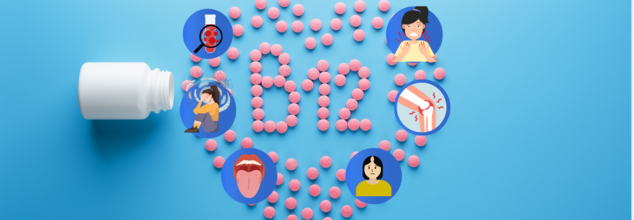
Vitamin B12 Deficiency Is Sneakier Than You Think, Even ‘Normal’ Levels Might Be Dangerous
We always believe we are getting enough vitamins as long as we are having a balanced diet, taking the occasional multivitamin supplements, and generally feeling alright. But then out of the blue, more and more people are constantly tired. Hands numb, memory felt foggy, and simple tasks start to feel more difficult than they should be. Like most people I was also experiencing similar symptoms and so I went and got a routine blood test done, my doctor dropped a bombshell- my blood work was excellent but still vitamin B12 levels were deficient!
What most amazed me? My levels were technically within the "normal" limit. That's when I found out that vitamin B12 deficiency isn't always apparent—it can sneak up on you, even if your blood tests are all okay. And the effects? They can be serious, from taking a toll on your nerves to impairing your brain function. If you’ve ever dismissed fatigue or brain fog as just a part of life, it’s time to take a closer look at this essential nutrient.
Vitamin B12 is important to the overall health of the body, and its deficiency usually goes undetected until it has created irreparable harm. The majority of individuals believe that being within the normal range indicates that they are protected, but studies reveal otherwise. Even those who are within the normal range for vitamin B12 levels are showing cognitive impairment and neurological issues. This presents an imperative question: Are we ignoring the actual effect of the deficiency of vitamin B12?
Vitamin B versus Vitamin B12
The use of 'vitamin B' is to define a group of water-soluble vitamins whose functions serve to keep many different body functions. Of these, vitamin B12 (cobalamin) is unique in serving as an integral part of the production of red blood cells, DNA formation, and the nervous system. All other B vitamins are predominantly derived from animal food sources, a fact that leads to concerns from vegetarians as well as persons with absorptive problems.
Hidden Dangers of Vitamin B12 Deficiency
Deceptive as it takes, Vitamin B12 deficiency will gradually make one manifest its full blown effects when most often taken for granted with nonspecific unhelpful clinical findings or at worse, overlooked with wrong diagnosing. This impressive Massachusetts General Hospital case featured a 62-year-old male patient who developed two months before presentation with alarming neurological and bodily manifestations of paresthesias, walking impairment, jaundice, and dyspnea. What did they discover?
A severe deficit in vitamin B12. If not treated, advanced B12 deficiency can cause permanent neurological damage, depression, paranoia, and even dementia.
Who Is at Risk?
B12 deficiency is most prevalent among older adults, but other populations are also at risk. Some of the most important risk factors are:
Strict Vegetarian or Vegan Diets – Because B12 occurs naturally only in animal foods, vegetarians who do not eat meat, eggs, and dairy might have difficulty obtaining sufficient B12 from diet.
Weight-Loss Surgery – Certain operations, like gastric bypass, can inhibit the body's uptake of vitamin B12 from food.
Digestive Disorders – Certain disorders, including celiac disease, Crohn's disease, and atrophic gastritis, can impede B12 absorption.
Long-Term Use of Acid-Reducing Medications – Commonly prescribed for heartburn, these drugs reduce stomach acid, which is needed to absorb vitamin B12 efficiently.
Aging – As people grow older, their stomach acid production decreases, making it harder for the body to extract B12 from food.
Symptoms of Vitamin B12 Deficiency
Vitamin B12 deficiency can take on a wide variety of symptoms, which can appear gradually or abruptly. Among the most typical symptoms are:
- Numbness or tingling in hands, legs, or feet
- Problems with walking and balance
- Weakness and fatigue
- Anemia
- Tongue inflammation or swelling
- Decline in cognitive function, memory loss, and confusion
Since these signs can be suggestive of other ailments, vitamin B12 deficiency frequently goes undetected or misdiagnosed.
'Normal' B12 Levels May Not Be Enough
One of the widespread myths is that if B12 levels are within the normal range, then nothing is wrong. But research indicates that even people with "normal" B12 levels may develop cognitive impairment and neurological dysfunction. A recent study revealed that even at the lower end of normal, individuals had evidence of slowed nerve impulse conduction and impaired spatial processing speed.
In the USA, deficiency is characterized as blood levels below 148 pmol/L. Nonetheless, research indicates that neurological manifestations can be present at higher levels, particularly if bioavailable B12 (Holo-TC) is diminished. This serves to reinforce the value of measuring functional B12 levels in preference to total B12 levels in the diagnosis of deficiency.
Link Between B12 Deficiency and Brain Health
Low B12 status is increasingly linked with cognitive impairment, memory loss, and dementia. Research has shown that deficiency in B12 is a causative factor for white matter injury in the brain and spinal cord, resulting in delayed nerve conduction. Elevated homocysteine due to low levels of B12 may also promote further brain shrinkage and neurodegenerative disorders.
Surprisingly, although B12 supplementation has the ability to correct such blood abnormalities as anemia, its effect on neurological symptoms is not as predictable. In a few instances, even with supplementation, slight neurological dysfunctions remain, emphasizing prevention and early detection.
Diagnosing and Treating B12 Deficiency
Because the symptoms of B12 deficiency are often subtle and nonspecific, diagnosis usually depends on a blood test for total B12, methylmalonic acid (MMA), and homocysteine. Individuals at risk—vegetarians, people with gastrointestinal disorders, and older individuals—should seek out B12 testing from their healthcare providers actively.
Treatment usually consists of dietary changes and supplementation:
Dietary Sources: Beef liver, clams, oysters, dairy foods, eggs, and fortified cereals are good sources of B12.
Oral Supplements: Use Standard B12 tablets or sublingual (under-the-tongue) tablets to ensure adequate levels.
B12 Injections: For serious situations or if there are absorption problems, intramuscular B12 injections are the answer.
Early detection of a vitamin B12 deficiency is important in order to avoid irreversible neurological harm. If you feel unusually tired, numbness, memory problems, or balance difficulties, ask your physician to check your B12 levels—despite the fact that they might be "normal." With ongoing research further emphasizing the intricacies of vitamin B12 metabolism, it is evident that trusting only on past definitions of deficiency can place many at risk.
B12 deficiency is far more prevalent than most people think and can be associated with profound health effects even when blood tests remain within so-called "normal" limits.

( Credit-Canva)
Money Can’t Buy Good Health! Why Europeans Live Longer Than The Wealthiest Americans?
Healthcare has increasing become more unaffordable for people in America. The rising costs of medicines and even life-saving treatments have been putting people in debt.
The U.S. experienced a sharper decline and a slower rebound in life expectancy than peer countries, on average between 2019 and 2022, due to increased mortality and premature death rates in the U.S. from the COVID-19 pandemic.
A new study published in the New England Journal of Medicine shows a surprising difference between the US and Europe. Even the richest people in America don't live as long as their equally rich counterparts in Europe. Think of it like this- if you compared the wealthiest people in the US to the wealthiest people in Germany or France, the Americans, on average, would die sooner!
In fact, sometimes the richest Americans have the same lifespan as Europeans who are ‘relatively poor’. This shows that there are bigger healthcare problems in the US that affect everyone's health, no matter how much money they have.
Are Lifestyle Differences To Be Blamed?
The food habits of Europeans are generally said to be healthier than most countries, including America. Europe's emphasis on local, small-scale farming and fresh, high-quality produce. which is also reflected in EU policies. The 2002 "General Food Law" set an integrated approach to food safety and creating the European Food Safety Authority (EFSA). EFSA works towards food safety and sustainability, and these efforts are based on research and scientific efforts.
While Americans also follow strict diets to make sure they are healthier, but there is a difference between use of additives, preservatives, and pesticides with the constant food recalls and food contaminations. On the other hand, EU’s "precautionary principle" makes sure any additives go through extensive reviews before being considered safe. US regulations are less stringent compared to their European counterparts. According to BMC’s 2019 Enviromental health report, there were 72, 17, and 11 pesticides still in use, which were banned by EU, Brazil and China respectively, in the US.
Researchers think it has to do with some key differences in how the US and European countries are set up. In many European countries, there's a stronger "safety net" – things like better access to healthcare for everyone, more support for people who are struggling, and maybe even less stress in daily life. The healthcare system in the US can also be very complicated and hard for people to navigate. On top of that, lifestyle factors might play a major role as well.
According to the International Monetary Fund, the per capita income of America is 89.68 thousand dollars, while the per capita spending on health according to the American Medical Association was 13,493 dollars in 2022.
The association points out the enormous and growing cost of healthcare in the U.S., the affordability crisis for many Americans stems from a combination of these high prices, the way healthcare is financed, and the fact that these costs often outpace income growth. The specific drivers of these high costs, such as drug prices and administrative complexity, are key factors in why many Americans struggle to afford necessary healthcare.
Is The US Healthcare System Failing Its Citizens?
To really understand how long people live in different places, the researchers from this study looked at a lot of information about people's health and when they died. The focus was primarily on people between 50-85 years old in the US and different parts of Europe.
It was found that no matter even if people were rich, middle class, or poor, Americans were more likely to die at any given age compared to people in Europe.
With likes of billionaire Bryan Johnson, who is working on aging backwards with biohacking and promoting strict lifestyle techniques for longevity; this study showcases other neglected aspects of US healthcare, highlighting the fact that wealth may not be the answer to good health.

(Credit-Canva)
Increasing Screen Time For Teens Could Be Blamed For Poor Sleep And Depression
Rising screen time and the increasing health issue among teens are no coincidence. This has become a common trend among teens who cannot seem to tear away from their electronics for any reason. While some may argue they have their school assignments, study materials and other important documents on these devices, one must remember that these smart devices have now become their wallets, books, reminders etc.
While the sufficiency of these devices is responsible for the increased screen time, new study shows that it is also responsible for poor sleep as well as a rise in the numbers of depressed teens. Published in the PLOS Global Public Health journal, the study reveals the link between screen time, lack of sleep and depression among teen girls.
Researchers found that girls who used screens a lot slept worse overall. They didn't sleep as deeply, and they didn't sleep as long. Also, screens made them want to stay up later, throwing off their body's natural sleep clock. This means their bodies were not in sync with their sleep-wake cycle, making it harder to get the rest they needed. All these changes in sleep ended up causing problems for teenagers, especially when it comes to their mood.
Depression Risk in Girls
Girls are much more likely to feel sad or hopeless because of bad sleep caused by screen time. Boys also had sleep problems from using screens, but it didn’t seem to affect their mood as much. Scientists aren’t completely sure why girls are more affected, but they think it might have to do with how their bodies and brains react to changes in sleep.
The researchers looked at thousands of teens and found that girls had twice as many signs of depression as boys. They also discovered that a lot of those depression symptoms in girls, almost half, could be explained by changes in their sleep caused by screens. So, if girls are spending too much time on their phones and not sleeping well, they are at a much higher risk of feeling depressed. The researchers mentioned how this study supports the ‘screen-sleep-displacement-theory’ and the results show how it impacts several aspects of sleep simultaneously.
What Is Screen-Sleep-Displacement-Theory?
According to this theory screen time, especially before bed, displaces both bedtime and sleep, which then impacts the sleep duration and quality. It could potentially lead to negative mental health outcomes, particularly among adolescents. In Sweden, where the study took place, health officials suggest no more than two or three hours of screen time a day. This is mostly to help teenagers sleep better. The study backs up this advice, showing that less screen time could mean better sleep and fewer feelings of sadness.
If schools and parents helped teens cut back on screens, it might make a big difference in how they feel. The study also showed that most teens are using screens for about an hour more than the recommended amount. This is a problem that needs attention, as it may be having a large negative impact on the mental health of teens, especially girls.

Credit: Canva
India Confirms 1st Bird Flu Human Death In 4 Years—Know Everything About It
India has reported its second human fatality due to highly pathogenic avian influenza (HPAI) or bird flu, marking the first such death in four years. While bird flu infections in humans are rare, they are highly lethal, with a fatality rate of one in two cases. The most recent victim was a two-year-old girl from Palnadu, Andhra Pradesh, who passed away in mid-March after being hospitalized for over 10 days at the All India Institute of Medical Sciences (AIIMS), Mangalgiri.
The pathogen responsible for the infection and subsequent deaths was confirmed only on 31 March, following a survey by the Indian Council of Medical Research-National Institute of Virology (ICMR-NIV). According to details shared by the state government, the child, who had a habit of consuming raw chicken, was admitted to the hospital on 4 March with symptoms including fever, breathlessness, nasal discharge, seizures, diarrhea, and reduced feeding. Two days before falling ill, she had reportedly consumed raw chicken. She succumbed to the infection 12 days later.
In a statement issued on Wednesday, the state government noted that no abnormal cases of respiratory infections had been identified in the ongoing survey. However, surveillance will continue for the next two weeks, with testing arranged for any suspected cases. Union health ministry officials stated that, based on data from the Integrated Disease Surveillance Programme (IDSP), no unusual surge in influenza-like illness (ILI) or severe acute respiratory illness (SARI) cases has been observed in the district in recent weeks.
A national joint outbreak response (NJOR) team has been deployed to conduct an epidemiological investigation and provide assistance to the state.
3 States Impacted By Bird Flu
This year, outbreaks of HPAI—also known as Influenza A virus subtype H5N1 or bird flu—have been reported in Maharashtra, Karnataka, and Andhra Pradesh. The trend follows a similar pattern observed in 2024, when states such as Jharkhand and Kerala, along with the aforementioned three states, recorded widespread H5N1 infections in poultry, prompting authorities to cull thousands of birds.The Union government emphasized that "human-to-human transmission of the H5N1 virus is uncommon, and the risk of any other epidemiologically linked case being reported is assessed to be low."
India's first recorded human infection of the H5N1 influenza virus occurred in 2021 when an 18-year-old boy in Haryana succumbed to the infection within days of contracting it.
In May last year, Australia reported its first human infection with H5N1, stating that the patient had acquired the virus in India. Towards the end of 2024, the deaths of four big cats—three tigers and a leopard—were attributed to H5N1 infection.
© 2024 Bennett, Coleman & Company Limited

